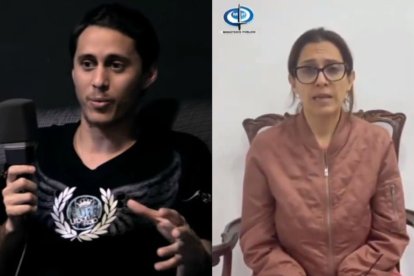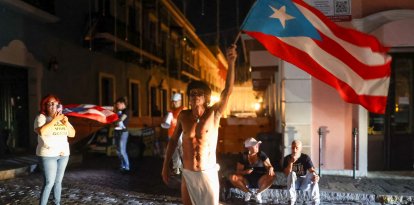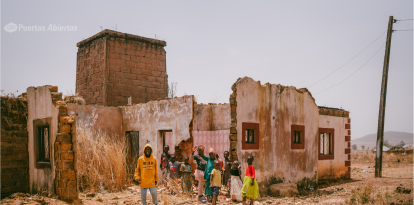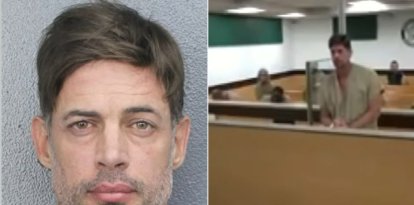Best Hispanic rapper, Canserbero’s former manager "confessed" that she murdered the artist with the help of Maduro's police
Almost 9 years after his death, the Venezuelan Prosecutor's Office reopened the case and finally concluded that the artist did not commit suicide.

Montaje Voz Media / Créditos: Wikimedia Commons; Fiscalía de Venezuela
This Tuesday, December 26, the controversy over the strange death of Venezuelan rapper Tirone José González Orama, better known as Canserbero, resurfaced. He is listed by Rolling Stone magazine as the most important Hispanic rapper in history. His former manager, Natalia Améstica, the only witness to the crime, "confessed" in a video that she was the one who murdered the singer and his friend, Carlos Molnar, who at that time was his partner.
The woman, in the video, published by the Venezuelan Prosecutor's Office, stated that she received help from her brother and SEBIN, the Police of the Venezuelan dictator Nicolás Maduro, so that the crime scene looked like a murder-suicide.
"The opportunity arose to record some videos at my house for Panama, the children went to their grandmother's, and the opportunity arose for me to make them tea, in that tea I placed two 0.5 Alpram pastes. They drank a few cups of tea each and when they became sleepy I was in the kitchen preparing dinner and when Carlos arrived, I saw how he was and I attacked him directly in the neck," said Améstica.
Améstica's confession comes days after the ninth anniversary of the event and after several months of investigation by the Prosecutor's Office of the Public Ministry of Venezuela, which, according to critics, is using the Canserbero case as political propaganda after years of neglect to find the truth about the rapper's death.
In the confession video, Améstica said that, after murdering Molnar and Tirone González, she altered the crime scene with the help of her brother, Guillermo Améstica, and several SEBIN police officers.
The now perpetrator of the crime began the video by explaining that she recorded her confession on December 19 and wanted to clarify everything that had happened.
Améstica stated that the problem started in Chile, during a tour that Canserbero had there and in Argentina. She was informed that she would not receive a payment and that the rapper had decided not to have her continue as his manager. She then decided to take revenge by drugging and murdering both her ex-partner and her ex-client.
"Not knowing what to do, desperate, I called my brother Guillermo to help me resolve that situation. He arrived at 11 at night accompanied by three SEBIN officials and they were in charge of arranging the scene so that it was a murder-suicide," Améstica confessed.
Two unreliable versions
The first official version of the death always raised doubts among criminalistic experts and also among his large and faithful fans because it had many loose ends. For more than eight years, the Venezuelan Prosecutor's Office claimed that the rapper had murdered Molnar and then jumped from the tenth floor in an act of desperation after killing his friend.
However, for a long time, this version did not convince the general public due to several details of the case, among them, the kitchen window from which the rapper had supposedly jumped was made up of glass planks that had previously been removed.
The method of removing these glass planks from the window and then jumping was an indication that the rapper was not desperate at the time of committing suicide, a version now denied.
However, even though there is now a video confession, many critics of the Nicolás Maduro regime and the Venezuelan Prosecutor's Office doubt the new investigation resumed almost 9 years later.
"If Canserbero's manager is declaring in the Public Ministry (controlled by Maduro) that she murdered him and then passed the murder off as a suicide with the complicity of SEBIN it is because the role of Chavismo in his murder must be much more serious than we know," tweeted activist Agustín Antonetti.
Sergio Monsalve, a Venezuelan film critic, also referred to the case, recalling that Canserbero was an artist who condemned in his songs the delicate political-social context that Venezuela went through during the Chavista era.
"Welcome to the upside-down world, where those who forgot Canserbero for 8 years, today claim it as an act of justice. Where those who censored Canserbero, by all means, now exploit his legacy and claim to defend it. It is an absurd story, which Canserbero would deny," Monsalve wrote.
So far, even though the Chavista regime's Prosecutor's Office has already investigated the case twice, fans of the Venezuelan rapper still doubt what happened on January 20, 2015, the tragic day when Canserbero was found dead under strange circumstances in the city of Maracay.
RECOMMENDATION





















